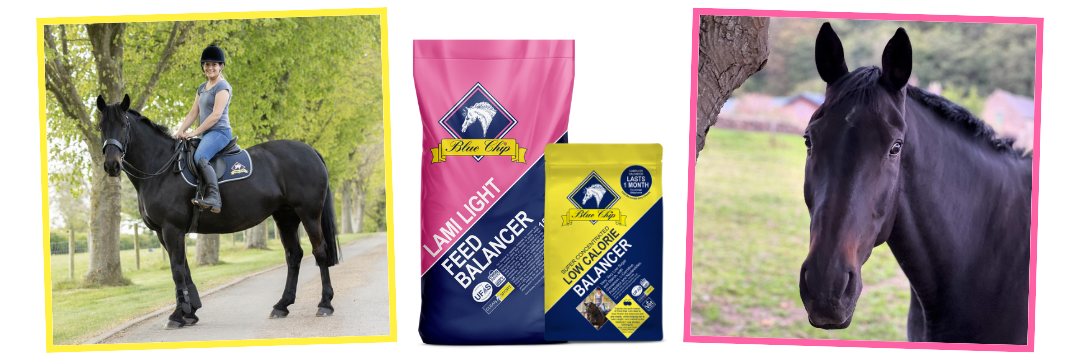Research shows that horses and ponies tend to eat more in spring than they do in summer, likely making up for lost time from the winter! As such, read on for some top tips for spring management ...
- Introduce new spring grass gradually with strip grazing, track system, grazing muzzle (not at all times) and/or limited turnout
- Track systems encourage your horses to move and burn additional calories
- Keep water at one end and the entrance/hay feeding at the other end, to encourage movement
Did you know?
Grass is the highest calorie contributor to your horses diet, if your pony/horse gains weight easily look here first when making changes to their diet to reduce calorie provision.

Weigh tape weekly (and record results) to make sure your pony/horse is not gaining unwanted weight Your pony/horse may be less inclined to eat in their stable overnight if they have filled their tummy in the field!
Make feeding changes (including grazing) gradually, this allows gut microbes time to adjust Good bacteria in the gut will die off if feeding changes are made too quickly. Without "good bacteria" horse's are more prone to diarrhoea, laminitis and colic.
Observe your pony/horse closely to note any digestive changes - yes, look at their droppings!
Digestive upset is common at this time of year. The continuation of feeding good quality fibre in the diet is imperative. Support a healthy gut with ingredients such as probiotics and nucleotides to aid fibre digestion.
LETS GET FACTUAL

FEEDING FACTS
Good doers still need a fully balanced diet WITHOUT the calories, feed balancers are ideal for these types, especially from the Blue Chip Super Concentrated range.
Feed a balancer containing magnesium for improved behaviour when levels are lower in new spring grass.
Choose a Low Calorie feed balancer if your pony/horse is prone to gaining weight.
For those prone to laminitis feed a balancer which includes prebiotics and probiotics (and ideally further digestive supplement) for additional support.
Beware of sunny, frosty mornings as they present a danger for those prone to laminitis. These conditions boost the levels of sugar and fructan, water soluble carbohydrates (WSC's) in the grass. Increased intake of WSC's can lead to laminitis, colic, and weight gain.
Those prone to laminitis may need complete removal from grass at this time of year (please consult your vet).
COMMON QUESTIONS
Q - “I don’t need to feed a balancer because we have good grass”
A - Grass is likely to provide most of the calories your horse will need in the spring, especially for good doers, however the mineral content of grass can fluctuate. Over time a deficiency in certain minerals could have a negative effect on your ponies/horse’s health.
Q - “I don’t need to feed a balancer as it will make my pony/horse fat”
A - All Blue Chip balancers are low in calories (and all molasses free) and contain minimal levels of starch and sugar, with no added sugar. Diet balancers and those aimed at good doers (such as Blue Chip Lami Light and our Super Concentrated range) are especially beneficial as part of a calorie-controlled plan. These balancers support overall health, which can lead to improved mobility and burning of further calories.
For those on a calorie-controlled diet, Blue Chip can work out EXACTLY how many grams of sugar and starch you would be feeding, just contact us and we can let you know. This is a preferred approach than looking solely at percentages, which can be misleading due to varying feeding rates.
Q - “I’ll just feed a vitamin and mineral supplement in the summer”
A - Balancers go one better than vitamin and mineral supplements as they contain quality protein which supplies essential amino acids. Amino acids are the building blocks of all body tissues, including horn, hair, muscle and bone so are very important. These additional ingredients are invaluable.
Q - “My pony/horse doesn’t need anything other than calories”
A - Don’t make the mistake of solely relying on calories to maintain the well-being of your pony/horse. Spring and summer grazing will provide calories, but feeding balanced levels of vitamins, minerals and supporting ingredients such as anti-oxidants and protein, allows for the correct balance to be achieved to keep your pony/horse healthy.
It is now recognised that up to 90% of laminitis cases are caused by an underlying hormonal disease such as Equine Metabolic Syndrome (EMS) and/or Pituitary Pars Intermedia Dysfunction (Cushing’s Disease). www.bhs.org.uk
Q - “Our fields are big so the ponies/horses are getting access to a varied and healthy diet.”
A - No matter how well your fields are looked after it will never be diverse enough or large enough to provide the correct vitamin, mineral and nutrient balance.
If you are concerned about high levels of starch and sugar in your horses’ diet, turnout overnight when the levels are lower, especially after 5pm as levels can peak late afternoon
Our feed advisors are here to help!
Email: info@bluechipfeed.com
Call: 0114 266 6200
Social: @bluechipfeed




